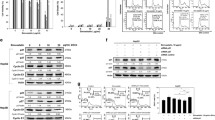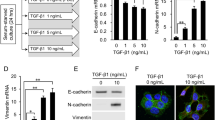Abstract
Lung cancer is the leading cause of cancer-related death worldwide. Transforming growth factor-β receptor II (TGF-βRII) plays an important role in the regulation of proliferation and progression in cancer. Statins have been documented to exhibit anticancer and cancer chemopreventive properties. However, the effects and mechanisms of simvastatin on the development of lung cancer are still unclear. In the present study, quiescent A549 cells were treated in vitro with fetal bovine serum (FBS) in the presence or absence of simvastatin. MTT, Western blot, and real-time qPCR were used to detect cell viability, activation of ERK, and expression of TGF-βRII at the protein and RNA level. Our results demonstrated that simvastatin inhibited activation of ERK, downregulated expression of TGF-βRII, and suppressed A549 cell proliferation. Furthermore, the effects of simvastatin can be reversed by farnesyl pyrophosphate (FPP). Therefore, these results suggest that simvastatin may inhibit A549 cell proliferation and downregulate TGF-βRII expression by inhibiting activation of ERK. Our findings may advance the current understanding of the effects of simvastatin on cancer progression and contribute to the study of cancer treatment.




Similar content being viewed by others
References
Jemal A, Siegel R, Xu J, Ward E. Cancer statistics, 2010. CA Cancer J Clin. 2010;60:277–300.
Hanagiri T, Baba T, So T, Yasuda M, Sugaya M, Ono K, et al. Time trends of surgical outcome in patients with non-small cell lung cancer. J Thorac Oncol. 2010;5:825–9.
Derynck R, Zhang YE. Smad-dependent and smad-independent pathways in tgf-beta family signalling. Nature. 2003;425:577–84.
Massague J. Tgfbeta in cancer. Cell. 2008;134:215–30.
Toonkel RL, Borczuk AC, Powell CA. Tgf-beta signaling pathway in lung adenocarcinoma invasion. J Thorac Oncol. 2010;5:153–7.
Kubiczkova L, Sedlarikova L, Hajek R, Sevcikova S. Tgf-beta - an excellent servant but a bad master. J Transl Med. 2012;10:183.
Rubtsov YP, Rudensky AY. Tgfbeta signalling in control of t-cell-mediated self-reactivity. Nat Rev Immunol. 2007;7:443–53.
Hsu HY, Lin TY, Wu YC, Tsao SM, Hwang PA, Shih YW, Hsu J: Fucoidan inhibition of lung cancer in vivo and in vitro : Role of the smurf2-dependent ubiquitin proteasome pathway in tgfbeta receptor degradation. Oncotarget 2014
Massague J. Tgfbeta signalling in context. Nat Rev Mol Cell Biol. 2012;13:616–30.
Tirado-Rodriguez B, Ortega E, Segura-Medina P, Huerta-Yepez S. Tgf- beta: An important mediator of allergic disease and a molecule with dual activity in cancer development. J immunol Res. 2014;2014:318481.
Weitz-Schmidt G. Statins as anti-inflammatory agents. Trends Pharmacol Sci. 2002;23:482–6.
Sparrow CP, Burton CA, Hernandez M, Mundt S, Hassing H, Patel S, et al. Simvastatin has anti-inflammatory and antiatherosclerotic activities independent of plasma cholesterol lowering. Arterioscler Thromb Vasc Biol. 2001;21:115–21.
Yu X, Pan Y, Ma H, Li W. Simvastatin inhibits proliferation and induces apoptosis in human lung cancer cells. Oncol Res. 2013;20:351–7.
Qi XF, Zheng L, Lee KJ, Kim DH, Kim CS, Cai DQ, et al. Hmg-coa reductase inhibitors induce apoptosis of lymphoma cells by promoting ros generation and regulating akt, erk and p38 signals via suppression of mevalonate pathway. Cell Death Dis. 2013;4:e518.
Du H, Hu H, Zheng H, Hao J, Yang J, Cui W. Effects of peroxisome proliferator-activated receptor gamma in simvastatin antiplatelet activity: Influences on camp and mitogen-activated protein kinases. Thromb Res. 2014;134:111–20.
Zhang Z, Zhang M, Li Y, Liu S, Ping S, Wang J, et al. Simvastatin inhibits the additive activation of erk1/2 and proliferation of rat vascular smooth muscle cells induced by combined mechanical stress and oxldl through lox-1 pathway. Cell Signal. 2013;25:332–40.
Miraglia E, Hogberg J, Stenius U. Statins exhibit anticancer effects through modifications of the pakt signaling pathway. Int J Oncol. 2012;40:867–75.
McAnally JA, Gupta J, Sodhani S, Bravo L, Mo H. Tocotrienols potentiate lovastatin-mediated growth suppression in vitro and in vivo. Exp Biol Med. 2007;232:523–31.
Hausding M, Witteck A, Rodriguez-Pascual F, von Eichel-Streiber C, Forstermann U, Kleinert H. Inhibition of small g proteins of the rho family by statins or clostridium difficile toxin b enhances cytokine-mediated induction of no synthase ii. Br J Pharmacol. 2000;131:553–61.
Mandegary A, Torshabi M, Seyedabadi M, Amirheidari B, Sharif E, Ghahremani MH. Indomethacin-enhanced anticancer effect of arsenic trioxide in a549 cell line: Involvement of apoptosis and phospho-erk and p38 mapk pathways. BioMed Res Int. 2013;2013:237543.
Cheng CY, Hu CC, Yang HJ, Lee MC, Kao ES. Inhibitory effects of scutellarein on proliferation of human lung cancer a549 cells through erk and nfkappab mediated by the egfr pathway. Chin J Physiol. 2014;57:182–7.
Shih YW, Shieh JM, Wu PF, Lee YC, Chen YZ, Chiang TA. Alpha-tomatine inactivates pi3k/akt and erk signaling pathways in human lung adenocarcinoma a549 cells: Effect on metastasis. Food Chem Toxicol. 2009;47:1985–95.
Hanson A, Poudyal D, Hagemeister A, Reindl KM, Sheridan MA. The erk and pi3k signaling pathways mediate inhibition of insulin-like growth factor-1 receptor mrna expression by somatostatin. Mol Cell Endocrinol. 2010;315:57–62.
Hagemeister AL, Sheridan MA. Somatostatin inhibits hepatic growth hormone receptor and insulin-like growth factor i mrna expression by activating the erk and pi3k signaling pathways. Am J Physiol Regul Integr Comp Physiol. 2008;295:R490–497.
Zhang Z, Sethiel MS, Shen W, Liao S, Zou Y. Hyperoside downregulates the receptor for advanced glycation end products (rage) and promotes proliferation in ecv304 cells via the c-jun n-terminal kinases (jnk) pathway following stimulation by advanced glycation end-products in vitro. Int J Mol Sci. 2013;14:22697–707.
Khanzada UK, Pardo OE, Meier C, Downward J, Seckl MJ, Arcaro A. Potent inhibition of small-cell lung cancer cell growth by simvastatin reveals selective functions of ras isoforms in growth factor signalling. Oncogene. 2006;25:877–87.
Salib RJ, Howarth PH. Transforming growth factor-beta in allergic inflammatory disease of the upper airways: Friend or foe? Clin Exp Allergy. 2009;39:1128–35.
Liu J, Hu G, Chen D, Gong AY, Soori GS, Dobleman TJ, et al. Suppression of scara5 by snail1 is essential for emt-associated cell migration of a549 cells. Oncogenesis. 2013;2:e73.
Lei Z, Xu G, Wang L, Yang H, Liu X, Zhao J, et al. Mir-142-3p represses tgf-beta-induced growth inhibition through repression of tgfbetar1 in non-small cell lung cancer. FASEB J. 2014;28:2696–704.
Bacman D, Merkel S, Croner R, Papadopoulos T, Brueckl W, Dimmler A. Tgf-beta receptor 2 downregulation in tumour-associated stroma worsens prognosis and high-grade tumours show more tumour-associated macrophages and lower tgf-beta1 expression in colon carcinoma: A retrospective study. BMC Cancer. 2007;7:156.
Burke JP, Watson RW, Murphy M, Docherty NG, Coffey JC, O'Connell PR. Simvastatin impairs smad-3 phosphorylation and modulates transforming growth factor beta1-mediated activation of intestinal fibroblasts. Br J Surg. 2009;96:541–51.
Kim S, Lim JH, Woo CH. Erk5 inhibition ameliorates pulmonary fibrosis via regulating smad3 acetylation. Am J Pathol. 2013;183:1758–68.
Buonato JM, Lazzara MJ. Erk1/2 blockade prevents epithelial-mesenchymal transition in lung cancer cells and promotes their sensitivity to egfr inhibition. Cancer Res. 2014;74:309–19.
Rodriguez-Vita J, Sanchez-Galan E, Santamaria B, Sanchez-Lopez E, Rodrigues-Diez R, Blanco-Colio LM, et al. Essential role of tgf-beta/smad pathway on statin dependent vascular smooth muscle cell regulation. PLoS One. 2008;3:e3959.
Chen ZX, Lei MX, Zhu LF, Zhang J. Effects of simvastatin on tgf-beta system of diabetic rat kidneys. Zhong nan da xue xue bao Yi xue ban = Journal of Central South University Medical Sciences. 2005;30:593–6.
Acknowledgments
This work was supported by a grant from the National Natural Science Foundation of China (No. 81273957).
Conflicts of interest
None
Author information
Authors and Affiliations
Corresponding author
Rights and permissions
About this article
Cite this article
Shang, L., Jia, SS., Jiang, HM. et al. Simvastatin downregulates expression of TGF-βRII and inhibits proliferation of A549 cells via ERK. Tumor Biol. 36, 4819–4824 (2015). https://doi.org/10.1007/s13277-015-3134-7
Received:
Accepted:
Published:
Issue Date:
DOI: https://doi.org/10.1007/s13277-015-3134-7




